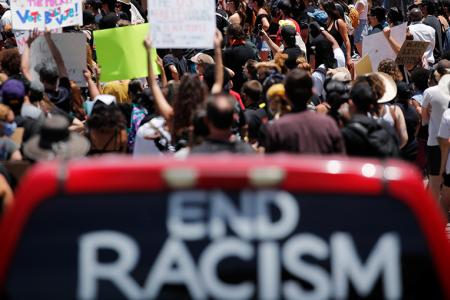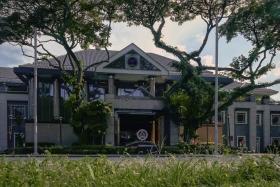Views: A Singaporean comes face to face with racism in US
As a Singaporean comes face to face with racism in US, she says the majority race here should not turn a blind eye to it
I am a Chinese Singaporean woman married to an African American man. Together we live in Berkeley, California, with our daughter, four, and son, one.
In the last week, I have:
- asked my husband to board up our bicycle shop;
- added additional security cameras to our shop;
- asked my husband if he would be safe going to work;
- lied to my daughter when she asked: "Will daddy come home alive?"
- removed the fingerprint ID ability on my mobile phone in favour of a six-digit code that the police cannot force me to surrender.
- written a letter to the Berkeley Police Department in response to their announcement that the murder of Mr George Floyd went against their mission, vision and values.
- asked if I could call 911 and expect help if my husband were under the knee of a cop.
Our family owns a small full-service bicycle shop, where we sell, service (professional bike fits for athletes) and repair bikes. My husband runs it.
On Sunday, our shop was broken into with US$20,000 (S$27,700) worth of bikes and accessories stolen.
The city of Berkeley is best known for attracting students from all over the world to the public Ivy, University of California, Berkeley. It is also home to the Free Speech Movement that started out as a student protest in 1964.
But in my eight years of living in the US, it is clear that free speech is not for everyone. Not if you are black.
When our shelter-in-place notice was first issued on March 16 to reduce the spread of Covid-19, schools shut and UC Berkeley students went home, drastically transforming the diversity of the city.
Students studying in other cities have returned to family homes in Berkeley, owned mostly by rich, white families, if not rented out to students.
The average property price in Berkeley is US$1.18 million, while the average property price in Oakland, a neighbouring city quickly gaining popularity among Silicon Valley tech workers, is US$833,000.
When Mr Ahmaud Arbery, a 25-year-old black man, was shot to death while jogging in February, things remained quiet in Berkeley while people stirred in Oakland.
It was the murder of Mr Floyd on video in May that sufficiently outraged enough people throughout the San Francisco Bay Area to organise protests daily since May 25.
While protesters in Oakland have been beaten and tear-gassed by police officers, the home of the Free Speech Movement has been strangely quiet.
Most families in Berkeley who want to stand up for black lives have had to join protests in Oakland and San Francisco.
We have had people walk into our shop and ask for the owner when it is clear my husband is the only one in the shop.
When a white man told my husband: "I hope you have good insurance because I am going to **** up your business, wife and children", and we called the police, the Berkeley police confronted my husband instead.
Growing up as a Chinese Singaporean, I had the privilege of not noticing skin colour.
I have told my husband that when I married him, I married into racism. It is now part of my life, our life together.
In Singapore, the Chinese do not have to worry as much about "looking" a certain way.
I cannot remember a time when I was the only Chinese person in the room. But being the majority does not mean we have to look the other way.
Chinese Singaporeans have got to start calling out their own to stop racism. Just because no one is dying under a knee does not make it less traumatic.
Privilege is blinding.
The writer is web editor for Facebook for Business News and was a journalist with The New Paper for two years.
Get The New Paper on your phone with the free TNP app. Download from the Apple App Store or Google Play Store now



